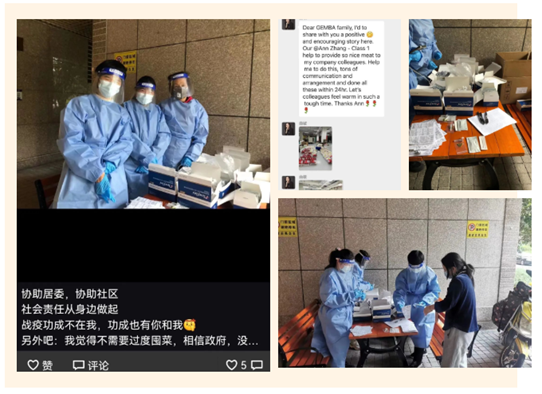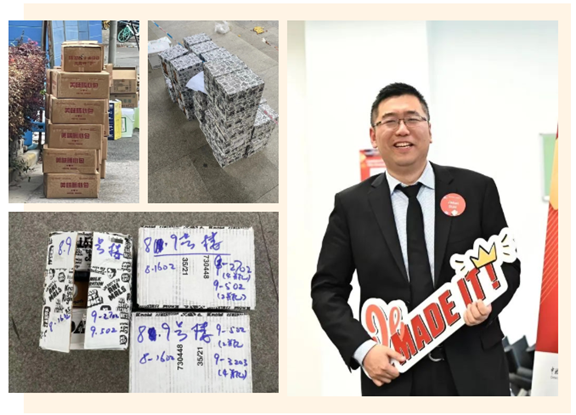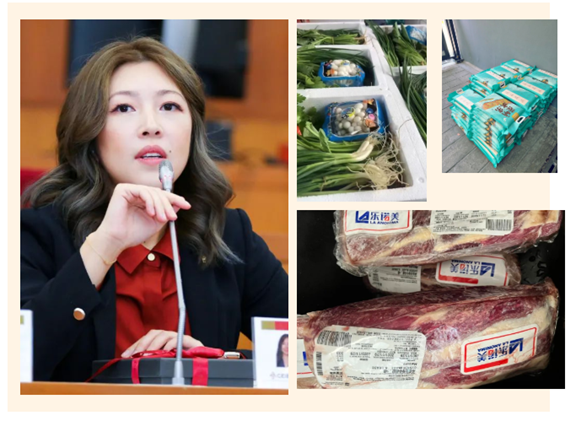Lockdown leadership – Global EMBA students making a difference

As the Shanghai lockdown continues with no end in sight, the past few weeks have demonstrated how difficult it is to supply a metropolis of over 26 million people with food and other essentials when its near-entire population is required to stay at home. The logistical challenges and daily pressures imposed on the city have been immense, and only a combination of government resources and cooperation forged between neighbours can prevent the situation from becoming untenable.
The reality in Shanghai, however, is that it remains difficult and time-consuming to successfully order food and have it delivered to your door, and the results are never guaranteed. The days of ordering anything and having it arrived within an hour seems like a distant memory. Very quickly, we’ve gone from near-instant culinary gratification to meeting the basic needs to feed ourselves and our families.
Group purchasing – A new necessity
For most people across the city, getting food means relying on two things – government food packages and ‘group purchasing’ orders. While state-sponsored food deliveries are handled by the government, the vast majority of private food suppliers require larger orders to make deliveries logistically (and economically) viable. In the early days of lockdown, people realised that a group purchasing mentality was needed to get most foodstuffs.
However, even with fewer, larger orders being placed, tens of millions of orders are placed every day, often overwhelming individual suppliers and their logistical capacity. As such, a great deal of coordination is required to secure orders, guide delivery drivers, liaise with community guards and committees, and ensure that food gets where it needs to go. Making order out of chaos is the job of a leader, and leadership is desperately needed across Shanghai.
Global EMBA students step up by leading their communities
While there are many stories of CEIBS students and alumni helping their neighbours and wider community during this difficult time, we want to highlight the exemplary actions of three students who have gone above and beyond the call of duty. All three have volunteered to as tuanzhang (团长), heads of a group or a group buying coordinator. This highly demanding role means that they are committed to helping dozens, if not hundreds of families and individuals, within their neighbourhood secure much-needed deliveries in a reliable and timely manner.
We asked them to share their experiences of this ongoing challenge, as well as their wider thoughts on the nature of responsible leadership in action.
Ann Zhang is General Manager at Parker Migliorini Food Trading, a premium meat import/export company operating in the US, Brazil and China. She is a member of the Global EMBA 2021 class.

Eileen Duan is Managing Partner of Shanghai Young Shape International Trading, a high-end design and luxury goods importer. She is a member of the Global EMBA 2020 class.

Jason Sun is VP for International Sales and Marketing for Maxphotonics, a private Chinese local company specialising in the fibre laser industry. He is a member of the Global EMBA 2019 class.

Becoming a tuanzhang
Ann: For me, it started with helping my classmates get some high-quality beef delivered. Given the nature of my company, I was ideally placed to help. Then, some of my colleagues needed help securing meat supplies, and before long I was trying to help my neighbourhood do the same. Now, as a tuanzhang, I help my community of over 300 people coordinate food deliveries and assist with COVID testing. I quickly realised that not many people are trained for coordinating work of this scale with such inherent difficulties, and I knew I could put my skills and experience as an executive to good use.

Eileen: At the beginning of lockdown, I just wanted to get a box of vegetables ordered for my family. However, I saw that the supplier would only allow a big order of 20 boxes, so I asked around in my building and organised a delivery. I saw that a lot of people needed help getting reliable food supplies, so it all grew from there. I started and developed a dedicated WeChat group which now has over 200 people. Myself and a core team of volunteers now organise, order and coordinate reliable deliveries of various food products for everyone in the group, and I think about 90% of my community are now well-stocked, which makes me really happy!
Jason: I saw a lot of people were having difficulties in completing certain orders. I have therefore initiated three purchasing groups: one each for ready-to-cook dishes, oat milk and coffee. So far, I’ve managed approximately 100 orders for around 100 families.
In each case, our students identified difficulties experienced by those living around them and decided to relieve the pressure by taking an active role as a group buyer. As we will see in the next section, this is a job that involves more than a few taps on a smartphone screen.
A second (unpaid) job during lockdown – The challenges and pressure of being a tuanzhang
Jason: There are challenges everywhere, from order accuracy, logistical issues (especially within the compound), communications with multiple parties and post-purchase difficulties. I’ve had suppliers delivering the wrong goods, trucks offloading to the wrong location, buyers picking up the wrong stuff, positive COVID cases getting in the way, breakages and leakages – it’s not just about ordering, it’s about troubleshooting and problem solving in a very hands-on manner.

Ann: It’s not easy to collate all the orders in a timely manner while coordinating the whole process from ordering to delivery drop-off and getting the packages from the compound gate to someone’s door. For meat products, there’s an added time-sensitive factor which means that well-organised planning and processes are essential to avoid mistakes.
Eileen: Things are likely to go wrong at some point, given the logistical challenges at play. This means you have to stand by to answer calls from suppliers or delivery drivers, and you need to offer solutions. In addition to the physical challenges, there’s also the mental stress that comes with high expectations. A lot of people began asking me to coordinate deliveries of non-essential ‘comfort foods’ – cookies, ice cream, etc. And, I got a lot of irate responses when I said I wanted to focus on the essentials. This is hard to deal with when you’re trying to help out. However, it’s important to remember that everyone is under a lot of pressure, and to be considerate of their feelings. It was an eye-opening experience for me in terms of interpersonal communication and expectation management.
From correcting errors to taking care of people’s emotions, it is clear that group purchasing coordinators are faced with a lot of challenges. It should be remembered that all of the time and effort invested by tuanzhang is purely voluntary, and on top of their existing responsibilities to their work and families.
What has this experience taught our students about the nature of responsible leadership in times of crisis? Surely, this is the time when such leadership is needed most.
Food for thought – Responsible leadership in action
Eileen: Responsibility came to the top of my mind when taking the job. Every delivery you organise carries the risk of bringing in infection, so you have to do everything you can to minimise that risk, and protect the people you serve. Leading to serve, serving to lead – that’s how I see this job, and it has affected the way I think of good leadership. I want to build a culture of community in my compound that will survive this COVID situation. Responsible leadership therefore means you have to build a culture and a mechanism to sustain and develop it. This means taking the time to understand the people you want to lead and inspire.

Jason: Compared with a company, it is much harder to lead people in a compound, since you’re dealing with an extremely diverse group of people with no common culture or values, all of whom have different situational needs. However, the common factor here is to enable everyone’s physical and mental safety and well-being. A good leader will be able to provide this through their actions and example. It’s difficult to gain the necessary trust of a community in such a short period of time, but I think responsible leaders can manage this by providing accurate and transparent information, managing expectations, demonstrating personal courage and sacrifice, and being committed to leaving no one behind.
Ann: This experience has broadened my understanding of what responsible leadership is all about. It’s about creating the right conditions for each member of the team to meet their needs and help them grow as individuals. In this case, it has meant providing people materially with the food they need to survive, and reducing their anxiety and fear at the same time. This goes beyond individuals. For example, when we saw large restaurant chains being forced to close their hops, we decided to help them by extending credit periods and relaxing payment terms. This is responsible leadership; you must look beyond the immediate bottom line and help grow everyone you work and partner with to grow.
Putting these three GEMBA students’ experiences together, we can see that being a tuanzhang has given them a new perspective on how vital it is to lead not just effectively but also responsibly when people’s health and well-being are at stake. All of them agreed on the need for compassion and the need to empathise with people they mean to serve and lead. Similarly, their experiences made it plain that clear, concise communication and management of expectations are just as important as end results in dire situations when people are anxious to secure the basic necessities needed to live.
Even though the lockdown is not over and the future remains unclear, these three leaders are determined to take what they have learned during this period and apply it to their leadership within their respective organisations. Their accounts remind us that lessons learned from the most challenging circumstances are often the ones that stick.
A final thought – Tough times call for true leadership
We hope that their shared experiences provide you with some food for thought as you contemplate your own leadership style, and the nature of leadership itself. As any attendee of his classes will know, Global EMBA Director Professor Bala Ramasamy considers responsible leadership to be a cornerstone of good business and an absolute necessity for the sustainable future of the world.

Bala Ramasamy
Professor of Economics, Associate Dean,
Director of the Global EMBA Programme, CEIBS
Irresponsible leadership is not leadership, in my opinion. It merely serves to promote oneself, for one’s own personal benefit, without any regard for others. By contrast, this gives us an idea of what responsible leadership should look like – leadership that puts others before self, that chooses actions that benefit others, and takes satisfaction in bringing joy and security to others.
True leadership is manifested particularly in turbulent times, whether they are natural or man-made calamities. No matter the source, a responsible leader is able to turn the turbulence into a unifying force for their community. It is not surprising then, that many individuals from the CEIBS Global EMBA community rose up to the challenges by providing that much-needed leadership to help various communities to go through difficulties during past few weeks. Our Global EMBA students and alumni are natural leaders, but it is their ability to lead and serve the whole community is truly the “diamond in the crown”. So, keep up the good work Global EMBAs! The smiling faces of your neighbours and friends will be the greatest reward for your hard work. And when the epidemic is over and everything is back to normal, you can look back and say, “I made a difference!”
We would like to thank Eileen, Ann and Jason for sharing their experiences, and for their selfless dedication and exceptional leadership during this time of crisis. This extends to any CEIBS community member who has put their skills and resources to use for the common good. Stay safe, eat well, and we hope to see you again in person soon!
Writer:
Tom Murray
Editor:
Effy HE, Michael Thede












